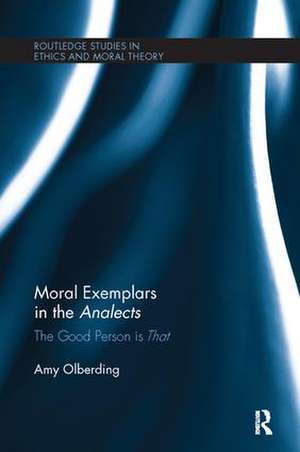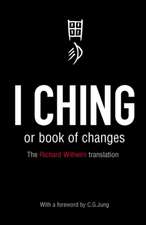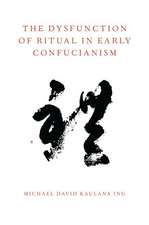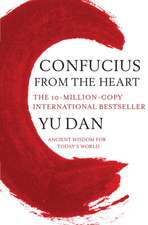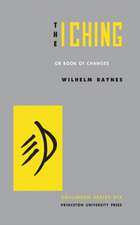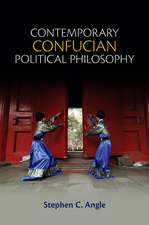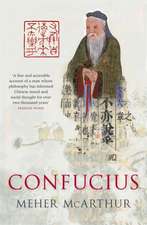Moral Exemplars in the Analects: The Good Person is That: Routledge Studies in Ethics and Moral Theory
Autor Amy Olberdingen Limba Engleză Paperback – 27 apr 2017
| Toate formatele și edițiile | Preț | Express |
|---|---|---|
| Paperback (1) | 436.14 lei 6-8 săpt. | |
| Taylor & Francis – 27 apr 2017 | 436.14 lei 6-8 săpt. | |
| Hardback (1) | 1114.64 lei 6-8 săpt. | |
| Taylor & Francis – 25 aug 2011 | 1114.64 lei 6-8 săpt. |
Din seria Routledge Studies in Ethics and Moral Theory
-
 Preț: 295.34 lei
Preț: 295.34 lei -
 Preț: 450.61 lei
Preț: 450.61 lei -
 Preț: 311.48 lei
Preț: 311.48 lei - 9%
 Preț: 1004.86 lei
Preț: 1004.86 lei -
 Preț: 311.51 lei
Preț: 311.51 lei -
 Preț: 309.50 lei
Preț: 309.50 lei -
 Preț: 311.41 lei
Preț: 311.41 lei -
 Preț: 325.74 lei
Preț: 325.74 lei -
 Preț: 311.06 lei
Preț: 311.06 lei -
 Preț: 313.72 lei
Preț: 313.72 lei -
 Preț: 716.43 lei
Preț: 716.43 lei - 18%
 Preț: 1112.55 lei
Preț: 1112.55 lei - 18%
 Preț: 1053.16 lei
Preț: 1053.16 lei - 18%
 Preț: 1054.89 lei
Preț: 1054.89 lei - 18%
 Preț: 1106.02 lei
Preț: 1106.02 lei - 18%
 Preț: 1058.10 lei
Preț: 1058.10 lei - 18%
 Preț: 1113.60 lei
Preț: 1113.60 lei -
 Preț: 416.22 lei
Preț: 416.22 lei - 26%
 Preț: 820.32 lei
Preț: 820.32 lei - 18%
 Preț: 1119.87 lei
Preț: 1119.87 lei -
 Preț: 382.47 lei
Preț: 382.47 lei - 30%
 Preț: 846.92 lei
Preț: 846.92 lei -
 Preț: 474.68 lei
Preț: 474.68 lei -
 Preț: 439.24 lei
Preț: 439.24 lei - 18%
 Preț: 1000.27 lei
Preț: 1000.27 lei -
 Preț: 411.42 lei
Preț: 411.42 lei - 18%
 Preț: 1057.40 lei
Preț: 1057.40 lei - 18%
 Preț: 1054.75 lei
Preț: 1054.75 lei - 26%
 Preț: 762.57 lei
Preț: 762.57 lei -
 Preț: 461.66 lei
Preț: 461.66 lei - 30%
 Preț: 848.57 lei
Preț: 848.57 lei -
 Preț: 408.38 lei
Preț: 408.38 lei - 18%
 Preț: 1109.18 lei
Preț: 1109.18 lei - 18%
 Preț: 1105.94 lei
Preț: 1105.94 lei - 30%
 Preț: 820.32 lei
Preț: 820.32 lei - 31%
 Preț: 763.39 lei
Preț: 763.39 lei -
 Preț: 483.20 lei
Preț: 483.20 lei - 18%
 Preț: 1109.99 lei
Preț: 1109.99 lei - 31%
 Preț: 764.22 lei
Preț: 764.22 lei -
 Preț: 449.41 lei
Preț: 449.41 lei - 18%
 Preț: 1055.51 lei
Preț: 1055.51 lei - 30%
 Preț: 848.31 lei
Preț: 848.31 lei -
 Preț: 482.17 lei
Preț: 482.17 lei -
 Preț: 428.09 lei
Preț: 428.09 lei
Preț: 436.14 lei
Nou
Puncte Express: 654
Preț estimativ în valută:
83.45€ • 87.14$ • 68.91£
83.45€ • 87.14$ • 68.91£
Carte tipărită la comandă
Livrare economică 16-30 aprilie
Preluare comenzi: 021 569.72.76
Specificații
ISBN-13: 9781138062771
ISBN-10: 1138062774
Pagini: 242
Dimensiuni: 152 x 229 mm
Greutate: 0.45 kg
Ediția:1
Editura: Taylor & Francis
Colecția Routledge
Seria Routledge Studies in Ethics and Moral Theory
Locul publicării:Oxford, United Kingdom
ISBN-10: 1138062774
Pagini: 242
Dimensiuni: 152 x 229 mm
Greutate: 0.45 kg
Ediția:1
Editura: Taylor & Francis
Colecția Routledge
Seria Routledge Studies in Ethics and Moral Theory
Locul publicării:Oxford, United Kingdom
Public țintă
Postgraduate and UndergraduateCuprins
1. Introduction Part 1: Theory 2. An Origins Myth for the Analects 3. The Analects’ Silences 4. Exemplarist Elements in the Analects Part 2: People 5. A Total Exemplar: Confucius 6. A Partial Exemplar: Zilu 7. A Partial Exemplar: Zigong 8. Conclusion. Bibliography. Index. Index Locorum
Recenzii
'In this elegantly written book on Confucius and his Analects, Amy Olberding does a splendid job of explaining how the narrative depictions of Confucius in diverse circumstances collected in the Analects make a necessary complement to the more theoretically or conceptually oriented components of the book.' – Notre Dame Philosophical Reviews
Descriere
In this study, Olberding proposes a new theoretical model for reading the Analects. Her thesis is that the moral sensibility of the text derives from an effort to conceptually capture and articulate the features seen in exemplars, exemplars that are identified and admired pre-theoretically and thus prior to any conceptual criteria for virtue. Put simply, Olberding proposes an "origins myth" in which Confucius, already and prior to his philosophizing knows whom he judges to be virtuous. The work we see him and the Analects' authors pursuing is their effort to explain in an organized, generalized, and abstract way why pre-theoretically identified exemplars are virtuous. Moral reasoning here begins with people and with inchoate experiences of admiration for them. The conceptual work of the text reflects the attempt to analyze such people and parse such experiences in order to distill abstract qualities that account for virtue and can guide emulation.
